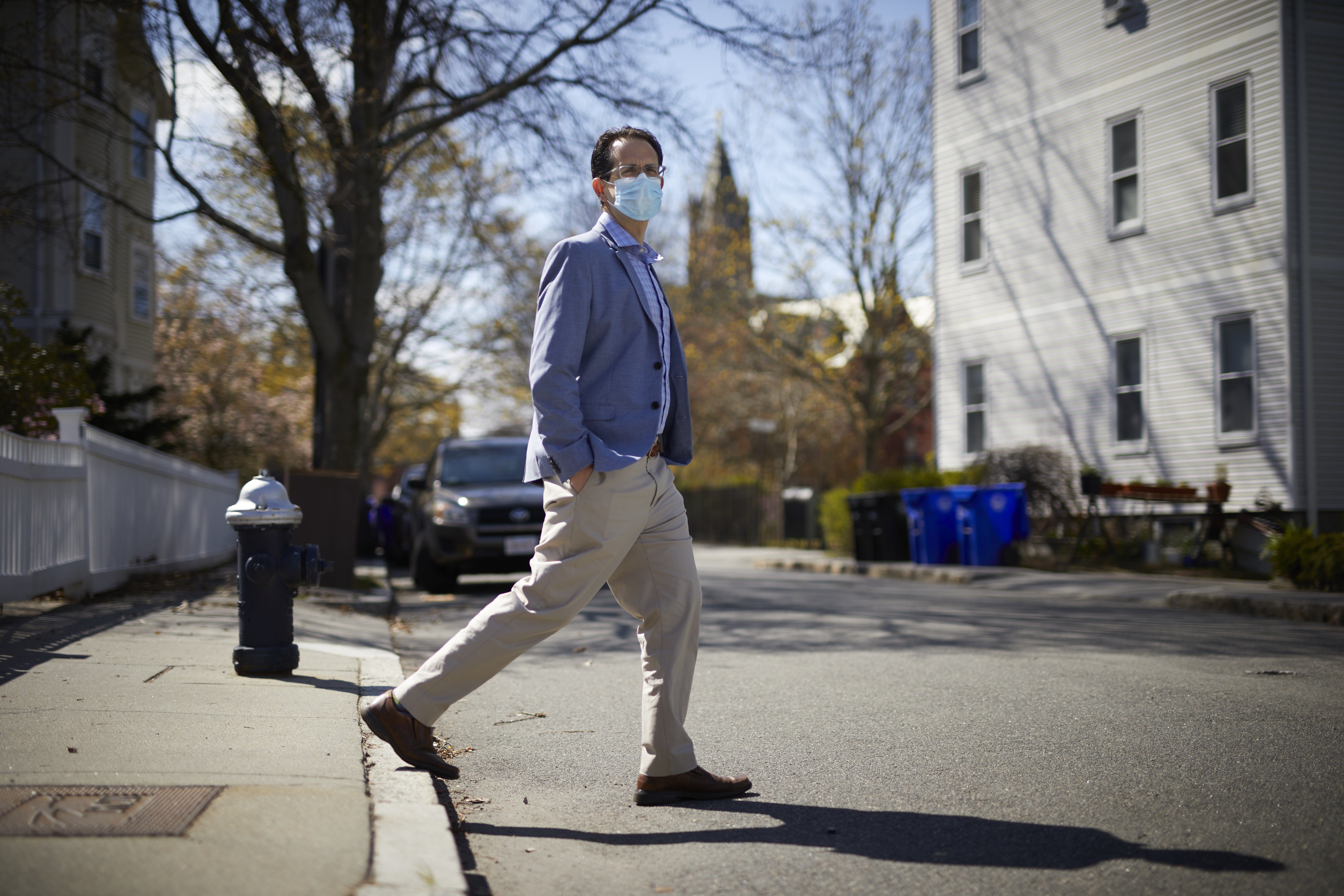
Asaf Bitton practices adult general internal medicine at Brigham and Women’s Advanced Primary Care Associates, a patient-centered medical home in Jamaica Plain, Massachusetts. He also is the executive director of Ariadne Labs, a joint center for health systems innovation at the Harvard T.H. Chan School of Public Health and Brigham and Women’s Hospital. As a public health researcher and health systems innovation leader, Bitton has led efforts globally and nationally to transform health care delivery systems and create high-quality, integrated care models. His March 2020 op-ed— “Social Distancing: This Is Not a Snow Day”— published on Ariadne’s website, went viral on social media, as strong government restrictions on movement and travel began to take effect in the early days of the COVID-19 pandemic.
“In public health, we deal a lot with numbers and models and forecasts and policy,” Bitton says. “But the clinical side reminds me every day that behind those numbers are human stories—families, real faces, and lives touched. To me, it’s a privilege to span both worlds.”
He spoke this spring with Madeline Drexler, editor of Harvard Public Health and author of Emerging Epidemics: The Menace of New Infections (Penguin, 2010).
Q: You have worked closely with health systems around the world. What do you most fear about how resource-deprived nations will be dealing with the pandemic?
A: My immediate fears are that, unfortunately, resource- deprived countries too often have health systems that are not fully capable of caring for the full spectrum of needs of their populations—even outside of a pandemic. They already face enormous structural, financing, workforce, and delivery challenges. But it should be noted that a country’s income level does not totally determine health care outcomes or responses. El Salvador is one nation that was initially able to mobilize rapid and effective responses to their first COVID-19 case and mitigate major transmission, whereas the United States’ $3.5 trillion-plus health system has had well-documented, massive challenges dealing with this pandemic.
Q: If money isn’t totally deterministic, what are the other fundamentals of a pandemic-resilient health system?
A: Effective health systems such as Costa Rica’s and New Zealand’s have certain advantages that they can leverage. The first is layers of coordinated, unified, transparent leadership structures, which allow a health system to respond in a dynamic way and with more flexibility than some of the disaggregated, federalized health system responses in high-income countries.
The second element of effective health systems is that they combine and coordinate clinical care and public health functions, as opposed to promoting the artificial divide that we have here in the U.S. In Costa Rica, for example, community health worker teams take care of a defined geographic community. They perform public health promotion and prevention functions, population surveillance, acute and chronic clinical care. They then integrate data feeds, both at the local and national levels, to gain awareness of the challenges facing the health system and how to quickly respond.
Q: Is public trust a pillar of pandemic resilience?
A: Trust is absolutely critical to pandemic resilience— trust, awareness, adaptability. An effective system is able to continually surveil its population but in such a way that people feel that they are each responsible for their collective health. In both Ghana and Costa Rica, community health workers are part of the fabric of most people’s lives. There are levels of cohesion and trust that, quite frankly, I don’t often see in higher-income countries.
In 2017, in an effort led by Margaret Kruk, a professor of health systems at the Harvard Chan School, my colleagues and I wrote a paper in BMJ about the building blocks of resilient health systems. We found that resilience fundamentally is not only about awareness and data gathering and monitoring but also about: Can information and trust cross the chasm between government and populations? Do people want to report new findings, even if the findings are troubling—as they have been again and again in this pandemic? Or do they feel like they will get censored or punished? If they do report the findings, are there adaptable systems that will respond, try new things, and learn from those efforts? And will there be an organized and coordinated central response to make hard decisions, divvy up resources effectively, and care for the most vulnerable?
The deepest measure of resilience is not just how a system responds to the initial shock, but how it bounces back and continues to deliver services for everything else on a daily basis, despite the shock. It encompasses the ability to withstand but also to keep functioning in the midst of adversity.
Q: Can something good come out of this global health tragedy?
A: Every crisis brings opportunity. I hope that this time around, we can move beyond our usual collective amnesia about the risks that pandemics pose and will continue to pose. They’re not going away. If we look at transmissibility, measles is almost unparalleled; you put measles in a room of unvaccinated people, and 90 percent of them will get infected. If we look back in history, we know that virulent strains of influenza, with transmissibility similar to today’s coronavirus or a little higher, are possible and would have even more devastating effects if we revert to our unprepared status.
My point is not to be morbid or depressing, but to say that while COVID-19 is bad, it’s not the worst possible case. It is the clarion call to preparedness and action—not just this year or even next year, but two or three years from now, when it will no longer be in the headlines.







